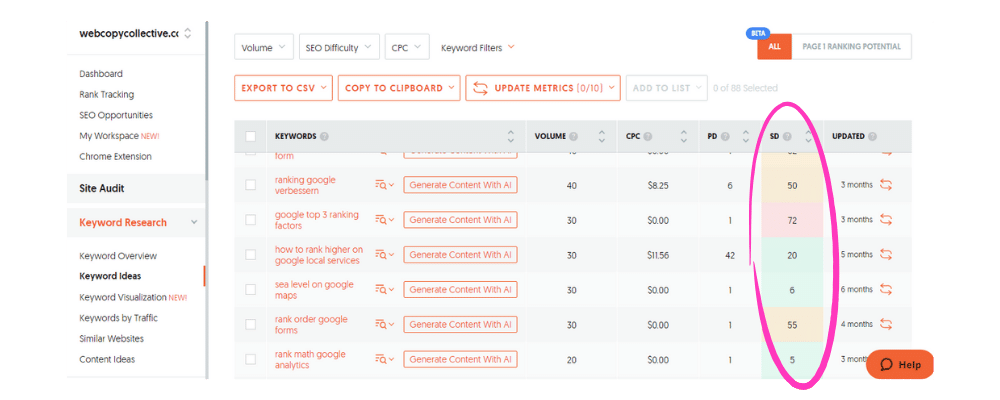How Do You Rank High on Google For Free?
Are your blog posts failing to rank on Google? I understand the frustration!
You can create high-value content, target keywords, and post religiously but still not see any improvements in your rankings and traffic.
So, what gives?
I’m going to show you why your content isn’t ranking in Google searches and what you can do to boost your traffic in a matter of months.
How Does Google Choose What to Show in SERPs?
To truly understand why your content isn’t ranking on Google, you need to understand what content is ranking.
Google will never disclose its exact strategy for choosing which web pages to show in searches — that would make it far too easy to cheat. However, the Google EEAT guidelines show us what content gets prioritised consistently:
Experience: Does your content share real-life experiences in your niche?
Expertise: Do you have qualifications, certifications, or training that make you an expert in your niche?
Authoritativeness: Is your website an authority in your niche? This relies heavily on the number of backlinks your website has.
Trustworthiness: Do people trust you? Have you got good reviews and word-of-mouth?
Remember that Google has billions of web pages to sort through and choose from. Even if you’re hitting all of these points, you’ve got a lot of competition to get to rank on Google.
Related: Why is SEO Important for Freelancers and Service Providers?
Why Isn’t My Content Ranking in Google Searches?
Let’s go through a list of common pitfalls that will stop your content from showing up in searches. Go through this list and make sure none of them apply to your website.
1. Your site isn’t indexed by Google
If your website isn’t in Google’s index, your content will never show up in searches simply because Google doesn’t know you exist!
2. You don’t have any backlinks
Google uses backlinks to determine a website's authority and trust. Without backlinks, you'll struggle to improve your Google ranking.
3. You don’t have enough content
Google crawls your website and categorises it based on the content you share. If you don’t have enough blog posts, Google will struggle to figure out how it should categorise your site, and you won’t show up in searches.
Related: What is Content Marketing? The Ultimate Beginner’s Guide
4. Your content isn’t keyword-optimised
When someone searches on Google, the algorithm matches the keywords in the search to those on relevant web pages. If your content isn’t optimised for searchable keywords, it won’t rank high on Google!
Related: My Top 7 Keyword Research Tools for Better Rankings
5. Your technical SEO isn’t on point
Google doesn’t like low-quality websites. If your technical SEO isn’t polished, it’s going to think your site isn’t well-maintained. From broken links and slow page speeds to confusing navigation and a lack of link structure, technical SEO can make or break a website’s rank on Google.
Want to take the guesswork out of your website SEO? Grab the Ultimate SEO Playbook now, and I’ll show you step-by-step how to optimise your content to rank on Google!
How to Rank on Google
Once you’ve taken care of website SEO, here are some quick and easy strategies to help boost your content to show up in more Google searches.
1. Post consistently
The more high-quality content your site has, the more chances you have to increase Google rankings. You should have at least 50 high-value blog posts, so try to post at least 2-3 times a week until you get to that point.
If you struggle to post that often, post a minimum of one post a week.
Once you get to 50 posts, keep posting. Google prioritises fresh, timely posts, so your newer content stands the best chance of ranking.
2. Aim for easy keywords
The higher the traffic a keyword has, the harder it is to rank for — there’s just too much competition.
Instead, aim for low-traffic keywords that the larger platforms aren’t targeting. Once you start showing up in more low-traffic searches, you can work up to the higher-competition keywords.
Use UberSuggest to find keywords to target for. Aim for one with a “search difficulty” under 40 for the best chance of ranking on Google.
3. Get Backlinks from High Authority Sites
The top ten sites that rank on Google usually have hundreds (even thousands) of backlinks. If you have zero, you’ll never compete.
Find guest post opportunities to get your website linked on high-authority websites. It takes time, but it is worth it.
Just 2-3 quality backlinks will seriously improve your Google rankings. And once you get that snowball started, you’ll find it easy to get more backlinks, which means more traffic, and your site can finally take off.
Grab the Backlink Site List for the exact strategy I used to get featured in Forbes, Hostinger, Business.com, and more — templates, guides, and examples included!
4. Update + refresh old blog content
Remember how Google loves sparkly new content? Refreshing older posts counts as new content! Go back through your old posts and give them a refresh using these tips:
Update the content if studies have changed, your opinion has shifted, or new information has come to light.
Add in new keywords to help boost SEO.
Add new links to fresh posts on your site to improve your internal linking structure.
Make sure any external links are still active and relevant.
Add new, branded graphics to add visual appeal.
Related: 16-Step Blog SEO Checklist to Boost Traffic Fast
Ranking on Google: The Takeaways
If your website is new and you’re not ranking on Google yet, don’t give up. It can take months for SEO and content efforts to start paying off.
But if you work on your technical SEO, post consistently high-value content, and start securing backlinks, you’ll see tangible boosts in traffic and Google rankings within the next three months!
Want an easy website content plan to help you create consistently high-value, optimised blog posts? Click that link to head to the next guide!

































![Is Grammarly Premium Worth it? [Review]](https://images.squarespace-cdn.com/content/v1/5910c2bec534a5947d4d3130/1739293407789-O7U2NFYVOR0DR6H06Y3N/Delicate+Feminine+Interior+Designer+Featured+Products+Facebook+Post+%2826%29.png)






